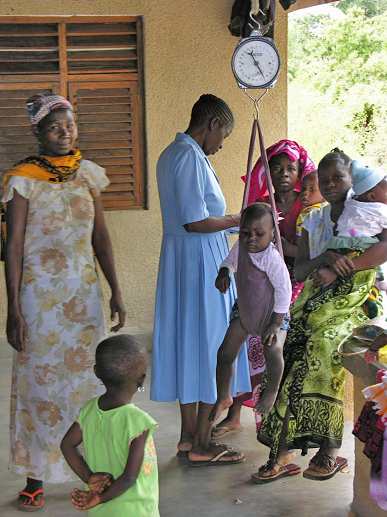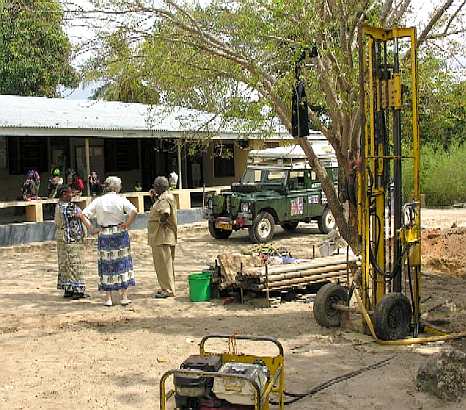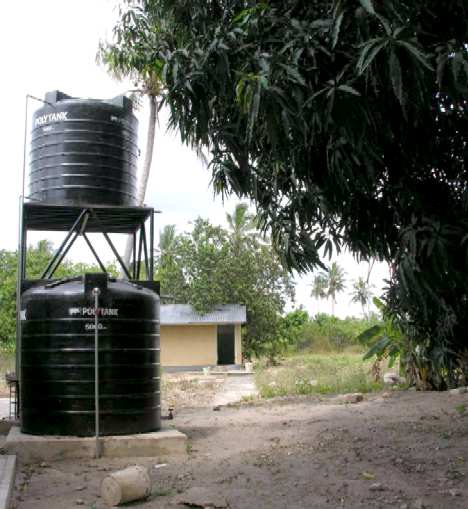

 |
 |
Mbande Clinic Sponsoring |
|
Progress Report Mbande Clinic Project
Mbande Village Clinic (progress report 1 – web version)
Date: September 16th 2006
Note: the Dutch version is updated with 2007 actuals
Introduction
Formally the clinic is the Temeke District Clinic Mbande Village. Temeke District is in the south westerly part of greater Dar es Salaam and comprises, among others, the Mbagala township area. An estimated 1 million people live in Temeke. Temeke has 1 district hospital and some 16 dispensaries and/or village clinics in the outlying areas. The Mbande Clinic is one of them.
Mbande village lies some 40 km south from the city centre. Until 10 years ago the village was small, some 800 inhabitants. Most of them were small subsistence farmers living in mud and wattle huts. There was and is no electricity and piped water. Recently, the population pressure in metropolis Dar es Salaam has created a spill-over into adjacent rural areas, including Mbande. Other factors that have influenced this urban-rural migration, are the construction of a tarmac road connecting Mbagala with Mbande, the connection, in the not too far away future, to the TANESCO municipal electricity grid and, last but not least, the much cheaper costs of living. Now (2006) Mbande has an estimated population of 15.000.

Weighing of children at the Mbande Clinic
Present situation (September 2006)
Originally, the Mbande dispensary consisted of one building as described in the project proposal. This building still exists, is in a reasonable state of maintenance and facilitates the same functions as described in the proposal. All present activities are concentrated in this building.
In 1997, a Dutch volunteer group financed a laboratory adjacent to the clinic. We visited the building and found it in a poor state of maintenance. Of the four small rooms, two are in use for nurses in training . In the remaining two rooms, a laboratory of sorts was established. Apart from a microscope, however, there is hardly any equipment and few if any reagents.
Next to the laboratory, is an unfinished building of an ante and post natal clinic. The building was finished including all stone block walls and steel reinforced main pillars and door and window spaces. It was abandoned 6 years ago, for reasons unknown, by the same Dutch volunteer group that had the laboratory built.
To our surprise, yet another building has arisen in the last three months: a small and modern delivery unit consisting of a one bed ward, a delivery room, a cleaning and washing room and a toilet. The building cannot be functional without running water and electricity (among others there is a huge electrical boiler) and neither of the two is supplied.
Discussion with those involved
On Monday 4th September, we meet all those directly responsible for the operation of the Mbande Clinic and/or the project:
· mr.R.L. Mbawala
- project coordinator
· dr.R.C.Muttani
- Medical Officer Temeke District
· mrs Victoria Ekonga -
Daktari Incharji Mbande Clinic
· mr Sharifu Amanzi - Chairman of the Mbande Village Clinic Committee
· mr Salehe Chaytundu -
Chairman of the Locality Committee (the part of the village where the clinic is situated)
In addition, the two Mbande Clinic nurses and all the members of the Mbande Village Clinic Committee are present.
After visiting all buildings, we meet on the waiting veranda of the Mbande dispensary. As usual, the Committee is very candid. No one was consulted with respect to the new delivery unit and, until today, no one knew what its function was to be. The Medical Officer expresses his surprise that the unit was built without water and electricity supply. When we inquire later about the unit, we learn that it, and some identical others throughout Tanzania, were financed by the African Development Bank (ADB) with the idea that local authorities would finance the supply of water and electricity. The future of the units, therefore, is clear: in most cases it will take time before they come into use. Priorities in the local budgets are many and there is not enough money to satisfy all demands. The Mbande dispensary is functional, as before, but is too small to cater for its increasing number of patients. The laboratory is still used as such but, according to us, lacks proper equipment, reagents, protocols and an experienced technician. The unfinished ante and post natal clinic, has a functional lay-out and, once ready, would satisfy the need for better ante and post natal care. Since there is already a new delivery unit, the two rooms designated for deliveries in the unfinished building could be turned into wards. All present, declare themselves in favour of finishing the ante and post natal clinic.
Our proposal
Two days later, 6th September, we are again in Mbande to explain our proposal in detail. In the mean time, we have also spoken to the Medical Officer again and visited his Temeke District Hospital. In addition we paid a courtesy call to the Temeke Municipal Director, mr I.A. Nyundu. We explain our plans and that we are willing and able to:
· finance a borehole and the necessary materials to bring water to the buildings of the clinic;
· finance the structural finishing of the ante and post natal clinic. The latter under the condition that the Mbande community contributes the necessary labour to the activities and that the local authorities provide the necessary furniture and fittings.
Before activities can start, in addition, we require written formal approval of the proposed activities from the Temeke District Council or its representatives and the consensual and oral approval from the village Committee. To our surprise a formal letter from mr Nyundu is instantly shown. It states that the Municipality is very happy with the initiative and will co-operate and assist in every possible way. The village Committee gives its oral consent.

Borehole drilling at the Mbande Clinic
Reactions to the proposal
All concerned agree that the bore hole should be drilled and made operational as soon as possible. Since we have already taken action on the issue, we can promise that the drilling will start within the next couple of days. All concerned agree that it should be a priority to complete the ante and postnatal clinic as soon as possible. It would, for the first time in the history of the Mbande Clinic, provide more than a make shift ward and enable women and their children to receive a continuous 48 hours care. Earlier, the Medical Officer and the Municipal Director had already indicated that they were content with the idea to complete the ante and postnatal clinic.
First, because it would relieve, to some extent, the pressure on a completely overcrowded Temeke District Hospital. Second, because it would enable the authorities to upgrade the Mbande Clinic to a village Medical Centre. More staff and funds could then be allocated to the Clinic. In view of the growing population of Mbande this was seen as unavoidable. We agree that detailed plans for finishing the building will be ready soon and that work on the building will start before the 1st October.
Work in progress
On the 16th September the bore hole drilling was completed. The drilling company had reached a depth of 80 metres, sunk the PVC perforated tubing and put a permeable pebble seal around the well. Next week, the well will be flushed (cleaned) and the water yield will be determined by means of some hours of trial pumping. After that, we will have to wait for another week or so for the regulatory water analysis. Since the tanks and distribution pipes have already been installed, the well can then be put into formal use. By that time we will be back in Dar es Salaam and report again.

The water tanks
As presented to sponsors: the project plan
© 2005-2007 Paul and Meta Lapperre - Website by MvS
